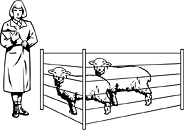kaleidoscope
Chuck Adler: The man with a plan
 Chuck Adler
Chuck Adler
PHOTO: OWEN EGAN | |
At first, Chuck Adler thought he was going to be a civil engineer. Engineers were in high demand during the days leading up to Expo '67, after all. But by the time he completed his McGill degree in 1971, Montreal was in a post-Expo depression.
"There were few jobs in civil engineering," says the director of McGill's University Planning Office.
But Adler was not too dismayed. Always drawn more to the planning side of engineering than the technical side, he jumped at the chance to return to his alma mater when the School of Urban Planning reopened in 1972.
"It was one of the best decisions I ever made," he says from his office in the James Administration Building, a bold stained glass portrait of an elephant trumpeting (crafted by his wife, Barbara Adler) hanging before the window behind his desk.
"The student body was fascinating; they came from all over in terms of their origins and backgrounds. We had everyone but doctors.
"Furthermore," says Adler, "it was a great time in urban planning. The profession was on the rise and the cities were getting master plans."
It was also a burgeoning time for construction on Canadian university campuses. "McGill probably doubled its size in a 10-year period," he says, noting that the '60s were the time of construction of such buildings as Burnside Hall, the Stephen Leacock Building, the McIntyre Medical Sciences Building and the Stewart Biological Sciences Building. "There were huge science complexes. It must have been wild to have been on campus in the early '60s — so much construction and political activity."
What drew Adler to the specialty of campus planning was "the fascinating combination of a town within a town with a unique population base."
He was also impressed by the man who would become his thesis adviser, then boss, Sam Kingdon. After leading the seminar in which Adler worked on the base data for a master plan for the University, Kingdon hired his student to continue the following summer, then supervised his thesis on master plans in Canadian universities, the following year.
After that, Kingdon hired Adler at the Office of Physical Planning, as it was then known. "He was a quiet person then and he still is a quiet, thoughtful person. He doesn't rush to conclusions. He does his work first, then draws his conclusions," says Kingdon.
Another of Adler's strengths is his ability to deal with people, continues Kingdon on the phone from his office in Ottawa. "He listens well and doesn't attempt to impose his opinion without thought or care."
According to Adler's description of the UPO's work, these would be important traits. "We're the what-if guys ... We study the financial, physical and academic implications of a proposed change," says Adler, explaining that the office provides the studies for the vice-principals. "We look at the data and try to project what will happen."
Part of that task involves trying to reach a consensus among parties with competing interests such as when two or more units want to use the same piece of land or building.
"We try to make everyone feel part of the process and understand what the final decisions are," says Adler, calling that pro-cess the most stressful aspect of his work. Forty-five minutes on the squash court is Adler's antidote to stress. "It's hard to beat."
What Adler likes about his job is the fact that one day rarely resembles the next.
Earlier this month, for instance, he met with the dean of arts to discuss a new arts building — to be located where the old student services building is — and the expansion this summer of the faculty's language lab. Then followed "the CFI (Canadian Foundation for Innovation) guys regarding brain imaging. They need expanded facilities so we hired an architect to help them. Then we have to ensure that when they expand, it's according to zoning regulations," he says, adding that once that's settled, the dossier goes to Facilities Development which attends to the coordination of construction.
The highlight of Adler's career to date is making the campus much more accessible to disabled people. "Fifteen years ago, we got calls everyday. We used to carry people into buildings. Now, people in wheelchairs can get around to most places," says Adler.
 |
||||
|
The best way to get bad music out is to put good music in. If something seems to be annoying you, listen to other tunes, because you can't imagine and hear music simultaneously. |
||||
Not Leaving it at Beaver

| |
Barron's has named it a "best buy" among colleges for the past five years. U.S. News and World Report ranks it among the top 20 colleges and universities in the northern U.S.
Despite these credentials, when the name of Beaver College comes up, giggles often ensue. And the college's administrators are starting to get fed up.
Officials, tired of being the butt of jokes because of the institution's sexually suggestive name, are thinking about changing it.
Alumni, students and faculty members are being surveyed for their views on whether the institution should adopt a new name.
In a letter sent out to alumni recently, Beaver College president Bette Landman wrote, "The word 'beaver' too often elicits ridicule in the form of derogatory remarks pertaining to the rodent, the TV show Leave It to Beaver and the vulgar reference to female anatomy. The latter is of growing concern."
Because its current moniker is slang for female genitalia, some alumni and prospective students have had trouble getting access to the college's web site because their computers' filtering devices prohibit viewing of sites with sexual content.
According to Tara Wenker, a first-year student at the college, changing the name would be a good move. "Everyone jokes about the name all of the time," she said. "It would be a little nicer for the students."
Administrators at the college will solicit opinions over the next few months, then take a recommendation to the Board of Trustees.
Source: The Chronicle of Higher Education
 |
||||
|
If students are to pay $28,000 per year, they're going to expect more than being stuffed in an old room on Peel Street. |
||||
In sheeps' clothing

| |
One of the leading proponents for using animals in medical research has switched sides in the debate.
Queen's University philosopher Michael Allen Fox authored The Case for Animal Experimentation: An Evolutionary and Ethical Perspective back in 1986, an influential book that argued that any suffering animals may experience in experiments is more than justified if it helps humanity.
The book was often cited by scientists to justify using animals in their research.
At the time, Fox argued "It is preposterous and insulting" to claim that animals and humans had equal moral status. He wrote that people, most of whom cherished stuffed animals and TV cartoons with animal protagonists as kids, tended to "anthropomorphize" animals.
"Animals' lives lack intrinsic value," he wrote, adding that "we are under no moral obligation to refrain from using them" in experiments.
In a new book, Deep Vegetarianism, Fox changes course, repudiating his former support for animal experimentation. He now says, "Our obligation to other sentient beings was much deeper than I had given allowance for."
In fact, these days he advocates eschewing eating meat.
"Most people don't question meat-eating," Fox told The Ottawa Citizen recently. He notes that meat is disguised in cellophane packages and given names such as pork and beef rather than pig or cow.
Fox predicts that in 100 years, most North Americans will be vegetarian.
"Branding, castration, dehorning, tail docking, separation of mothers from young, disease are a few examples of the fate of farm animals in the past as well as the present," he writes. "The final act of slaughtering for any kind of animals entails extreme suffering."

